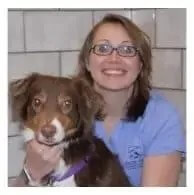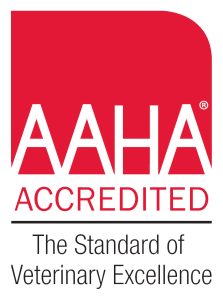Puppy Socialization
Written by Dr. Wittenburg of Brook-Falls Veterinary Hospital & Exotic Care, Inc.

Puppies need socialization, and there is only a small window of time for optimal success. Puppy socialization requires them to be exposed to different environments, people, and new situations to develop into well-rounded pets and wonderful family companions. With so many people being home during > and, lots of puppies miss out on that crucial time of and do not know how to be alone. There are some simple solutions to these problems. This article will illustrate how to help your puppy socialize, prevent separation anxiety and help your puppy learn to work and play well with others.
When Should you Start Puppy Socializing?
Your puppy’s first three months of life will permanently shape its future temperament and personality. These first few months will mold how they will react to their environment as an adult. We recommend you begin puppy socialization and training in these first few months of life – as early as 8- weeks! It is crucial for them to learn to socialize with people and other animals. A puppy that has already been exposed to various people, places, smells, noises, handling, textures, and situations before this time is a great starting point—waiting longer than this may cause social anxiety and stress on the puppy when new situations occur.
What Goals Does Puppy Socialization Aim to Accomplish?
Puppies that are not socialized may develop fears of everyday environmental and social situations if not exposed to them at a young age. For example, some dogs may be fearful of children, anxious about being in the car or become aggressive towards other dogs. Proper puppy socialization allows the pet to encounter these situations in a safe environment that allows for positive acclimation to new signs, sounds, smells, and people. Having a well-adjusted puppy will serve as the guide for the puppy throughout its life and help prevent behavioral issues in the future.
How do I Socialize my Puppy During a Pandemic?
You can do many things at home to help acclimate your puppy to new environmental conditions and allow them to experience new things positively. The more things the puppy can experience in its first few weeks or months of life, the more it will adjust to those situations and people. You should try to expose your puppy to as many new and variations of people, places, noises, and textures as possible. There are many ways, included below, to help you socialize, even during these times when you are not social, yourself.
- People: Take your puppy for a walk and socially distance yourself from others but have positive interactions. Allow your puppy to see others and have other family members walk up to your puppy while it is outside on a walk to have positive experiences on walks. Pulling your puppy away from new people and pets on the street can lead to frustration and even fear of new people and pets. You should plan to distract your puppy with treats, positive physical contact or toys before this excitement occurs. Positive interactions will help teach the puppy that new people and pet interactions are a positive experience, and they will be rewarded for positive interactions. Offering positive reinforcement when your puppy experiences new things is the key to making these new interactions good ones- the key is avoiding negative reinforcement. During this type of puppy socialization, one tip would be to have family members “dress up” and wear different glasses, hats, coats, and clothing to look different and encounter the puppy in different environments. You should also have them meet a person who uses a cane, a small child, a person with facial hair, or a person wearing a hood. Making it fun or a game and getting the whole family involved will also help.
- Places: You should try to take your puppy to different places- you can start with short car rides to the park or down the block and walk the puppy around a slightly different neighborhood. This will help get them used to new smells and new places. Looking for places that look different than your current area or parks will also help with the diversity by having them smell other places and see different things. You can even sit with your puppy outside in an exercise pen and watch the neighbors do activities. You can also take your puppy to an open grocery store or other business and sit in a secure area of the parking lot, giving treats or other positive reinforcement as your puppy watches people walk by. To help with office visits, you can play dress-up, use your creative side, and pretend that you are a veterinarian. For example, you can wear a white sweater or coat and place your puppy on the washer, dryer, or higher table with a non-skid mat or soft rug so that they do not slip. You can then touch your puppy’s mouth, teeth, ears, feet, and back while always using gentle handling techniques not to cause the puppy any pain or discomfort. In summary, getting them used to new places will help them have positive experiences when they visit new locations, and they will better know how to act.
- Noises: You can play different music for your puppy, using various styles, tempos, and volume ranges to help them learn and feel safe. Playing music when you leave the house may help to soothe the puppy. Different music, movie noises, or even traffic noises can be scary to a puppy. You can run the vacuum around the puppy or hairdryer or other daily noises that your puppy may be exposed to on a regular basis. Allowing them to experience noises in a positive way can be helpful. Using the hairdryer on a low and cool setting and blow-drying the puppy’s back or around their feet may be helpful, meanwhile avoiding areas by the face, ears, and nose as this can be stressful to a puppy. Sitting with your puppy in a car in a safe area that has lots of traffic noise or playing movies with noise may be helpful. Playing videos of firecrackers, thunder, other dogs barking, and other loud noises can help with sensitization by starting with the noises very soft and increasing over time. Rewarding your puppy for good behavior and tolerating the noises will be important as well. This way, they can learn that the noises are not scary.
- Surfaces: Puppy socialization includes having your puppy walk on all types of surfaces to get used to them. Ensure they are comfortable walking on grass, leaves, concrete, gravel, linoleum, carpet, wood, sand, etc. Walk them outside on concrete and grass and some rock surfaces and other uneven surfaces. Have the puppy walk over, under, and around different things. Place cookie sheets or pillow obstacle courses in the house and have them walk over the areas to experience different textures. Think of fort making when you were a kid- getting the whole family to help design a proper obstacle course for the puppy can be a bonding experience for everyone!
- Stay Positive and Give Praise: Puppies do great with positive reinforcement. Something as simple as a good belly rub or head pat can be helpful to a puppy. Keeping some good, high-value treats available when something new and possibly scary is occurring can really help shape the experience in a positive way for the puppy.
- Start Slow: Avoid overwhelming the puppy with a lot of new experiences or people at one time. Start with one new thing at a time and build on the new item or the new person. Slowly increase the puppy’s exposure and always make sure that you don’t put them in an overwhelming situation. Puppies can get easily overwhelmed and overstimulated. If you find the puppy is getting overstimulated, it is ok to stop and start over again once the puppy has had a break and time to relax and calm down. We want them to think about what is happening so they can form good memories of the interaction.
Can My Puppy be Social Safely During a Pandemic?
Say yes to dog training and socialization, even in these crazy times! Many of us are asking these same questions. Can my puppy pick up or spread COVID-19 to other humans or me? The World Health Organization (WHO), the , and the have all emphasized that, based on the available evidence, . At this time, there is no evidence that coronavirus can be transmitted to people via an animal’s fur/coat. However, to be as safe as possible, upon returning home from a walk or social interaction during which your puppy has interacted with another person or animal, you can wash your puppy’s collar and leash either by hand or in the laundry. Ensure that the collar and leash are thoroughly washed and dried before placing them back on your pet to avoid irritation and infection to the neck area. You should also make sure that your puppy does not leave the house without their proper identification/collar- having a spare may help this so that your puppy always has an ID on them.
For your safety, wear a mask and maintain six feet of space from the nearest human being: this should be easy as most retractable leashes are a length of six feet. It is also imperative to wash your hands for at least 20 seconds after every encounter or use alcohol-based hand sanitizer. Being in an outside arena or a large open space is a great thing to do to enrich your puppy’s life, and if you are staying 6 feet apart from other people, this is a safe space for both you and your puppy.
Let your Puppy Get Social, and Let’s Make Sure it’s Safe:
All puppies should receive, at minimum, at least 1 DHPP (Distemper, parvo, parainfluenza, and infectious canine hepatitis vaccine) and Bordetella (kennel cough vaccine) before socializing with other dogs in controlled environments. The canine flu vaccine should be added for optimal protection. Your pet should also have a fecal sample checked for parasites and have some flea and tick medication to prevent parasite transmission from one puppy to another. They will need further vaccines for proper immunity, but these are the minimum they will need to be social with other animals that are of the same age and immune status.
Now that they are safe, what do we do?
Once all the fort building and dress up time at home are done –
Start by Going to Puppy Classes
Once your puppy has started the vaccines discussed previously, it can attend puppy training classes. These classes are crucial to not only help your puppy begin to understand basic commands but, most importantly, expose him/her to new animals and people. Trainers will help guide you and your puppy in these challenging times and help teach basic manners and proper social skills. These training sessions are safe areas where all the puppies in the classes should all have received vaccines, parasite testing, and flea and tick prevention. If you’re looking for puppy socialization classes, these are the safest places to socialize with other canine friends where vaccine status has been confirmed, and interactions can be monitored for safety and positive interactions. These are ways for the puppy to experience new places safely. Do not take your puppy to the pet store or other areas where unknown vaccine status pets may be present until they are fully vaccinated. Full vaccination usually occurs at 16-18 weeks of age.
recently celebrated our one-year anniversary and have had many canine graduates of our training classes. We continue to offer training classes throughout the year, with flexible scheduling and different training and socialization levels.
Please see our puppy and adult dog training class calendar.
If small groups with other people are not what you have in mind, small play dates or doggy daycare may be a better alternative. Playdates should be limited to interactions with healthy puppies that are greater than 20 weeks of age that have been vaccinated, and have good immunity. Please see your veterinarian to discuss which vaccines they recommend and when they should be administered.
Safety on Your Playdate
Ensure your puppy’s playmate has not been directly exposed to anyone who has tested positive or is under isolation for COVID-19. You can arrange a pick-up and drop-off to encourage social distancing. Socializing in a place with a fenced yard or pen, the playmate can come to visit in a safe environment. It is not recommended to have playdates in public locations with pets of unknown vaccine status. Limiting playdates in this way will ensure that your puppy is as safe and healthy as it can be and still socialize with others and learn to play and interact with different people and pets. This will also teach them that it is ok to be left with others and that they do not need to be with the owner, decreasing the chance of separation anxiety for the pet when they are left with others in the future.
The above will help your puppy become a well-rounded pet and have good, positive interactions when things change and we are more social again!
Please contact Brook-Falls Veterinary or Brook-Falls Luxury Pet Resort with any questions you may have.
About Brook-Falls
Brook-Falls Veterinary Hospital and Exotic Care is dedicated to providing quality care to all companion pets and exotic animals. Brook-Falls is a -based full-service veterinary hospital with an extensive range of comprehensive medical, dental, diagnostic, and surgical services to meet the varying needs of all patients. Brook-Falls Veterinary also offers informational and educational media and seminars for pet owners by way of blogs, digital TV series (Expert Veterinary Television), e-books, whitepapers, infographics, and more.
For more information, contact Brook-Falls Veterinary Hospital & Exotic Care, Inc.


